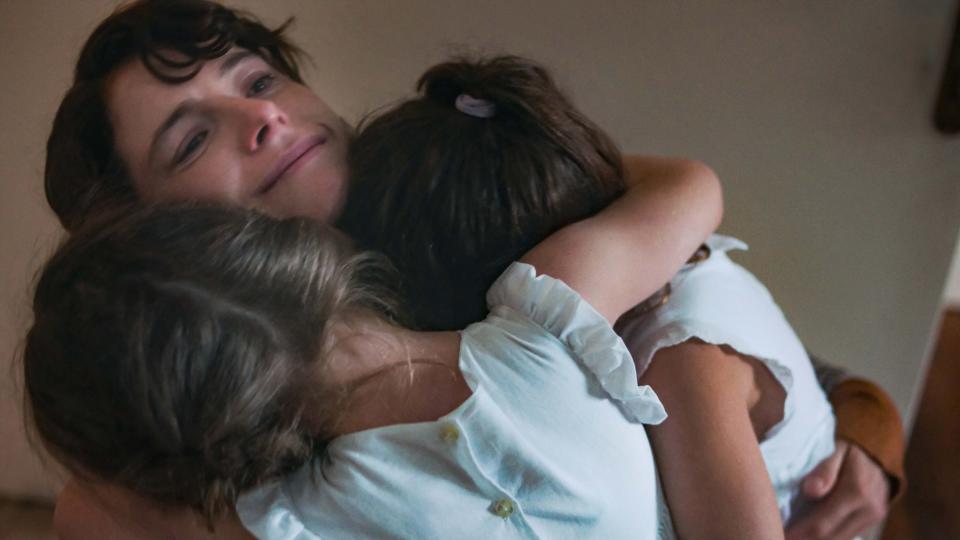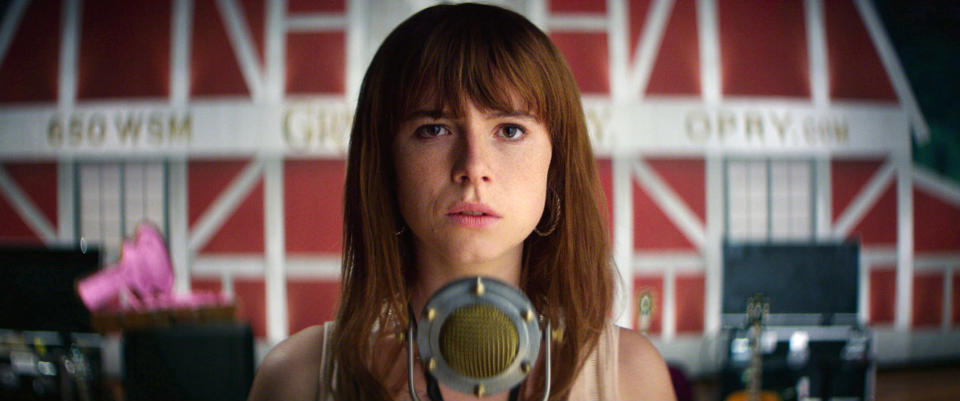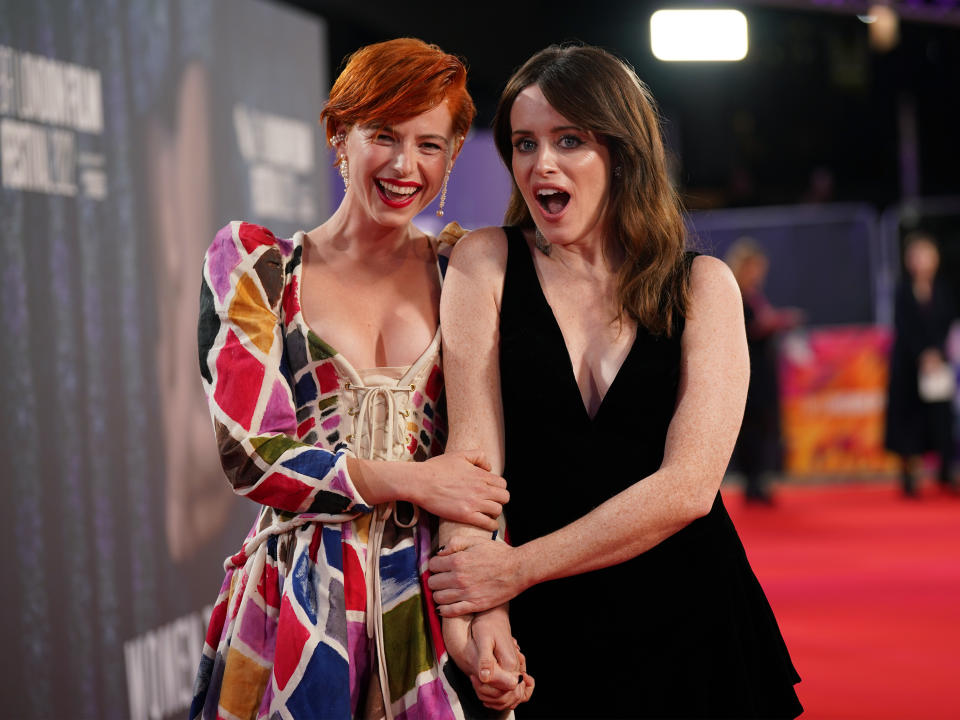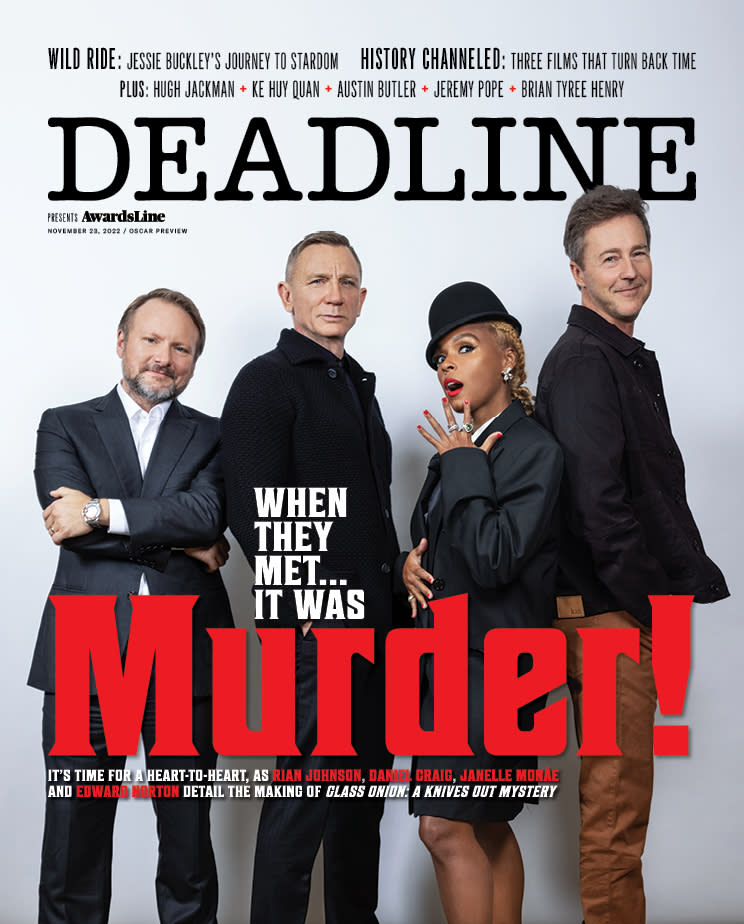Jessie Buckley: ‘Women Talking’ Resonated Because “It Isn’t Just A Female Experience, It’s A Worldly Experience”
- Oops!Something went wrong.Please try again later.
- Oops!Something went wrong.Please try again later.
- Oops!Something went wrong.Please try again later.
- Oops!Something went wrong.Please try again later.

When Jessie Buckley first read Sarah Polley’s script for Women Talking, it bothered her. There they were, a bunch of women sitting in a barn in the back-blocks of Canada, talking about what they were going to do with their lives: they wouldn’t let her go. “There was so much unknown within it, which was the best part of it, because it kept nagging me,” she says. “Even after I’d read the original book and met Sarah, it was something that kept just returning. I was like, ‘Get out! Get out of my head!’”
Of course, Women Talking wasn’t going anywhere. Buckley duly ended up playing Mariche, an abused wife and mother in a fundamentalist Christian community where women are not even allowed to learn to read. Buckley shows us a woman simmering with an incipient anger she can’t even name. It is a shining performance within a strong ensemble that could well bring her a second Oscar nomination for Best Supporting Actress, following her nomination last year for her complex portrait of a reluctant young mother in Maggie Gyllenhaal’s The Lost Daughter.
More from Deadline

All this is part of a seemingly unstoppable phenomenon. Now 32, Buckley was 17 when she left Killarney in Ireland, hoping to get into London’s Guildhall School of Music & Drama. When she didn’t make the cut, she threw herself into Andrew Lloyd Webber’s I’d Do Anything, a television talent quest to find a young unknown to play Nancy in a West End revival of Oliver!. She missed out by a few votes, went on to sell cereal in a street market, then got into Royal Academy of Dramatic Art. The year was 2010; Jessie Buckley was up and away.
Since then, she has brought a forthright conviction to every role, her guileless lopsided grin lighting up the screen as an aspiring country singer in Wild Rose, as a fish out of water in Charlie Kaufman’s elliptical I’m Thinking of Ending Things, and as a romping rebel in a dramedy about ’70s feminism, Misbehavior. Women Talking, however, doesn’t allow for much smiling.
Based closely on a novel by Miriam Toews, it is a what-if scenario inspired by a bizarre, real-life campaign of rape that took place in a Mennonite colony in Bolivia. Between 2005 and 2009, women and girls in the community were waking up in the morning bruised and bleeding, having been attacked in the night, their injuries, pregnancies and diseases written off by their elders as hysteria, Satan’s work, or a punishment by God. Eight men in the colony were eventually found guilty of drugging the women with animal tranquillizers and raping them. In her novel, Toews turns the tables on events by staging a summit meeting in a barn where women of the colony debate what to do. Should they stay and demand equal rights? Or should they just leave, even though few of them have even stepped outside the colony’s gate before?

Buckley comes from a large family with parents who encouraged everyone to do whatever they liked, but to be bold about it. In a recent interview with The Guardian, she said that she wanted to “live life with danger and darkness and character, and wildness and stories, and ancient things and new things”: a shopping list of raw experience.
Even so, the kind of closed hivemind in the sect shown in Women Talking was something she recognized from childhood. “When I was growing up in Ireland, there was definitely a part of me as a young teenage woman that was terrified of being the woman that I might become, because I was told to be accepted, you have to be smaller in life,” she says. “All the things that you just quoted: they were so in me already. Before I’d even stepped into that, I was exploding! I guess things shift within you. If you get an opportunity to read a book or to experience different cultures, or to have a voice, or to challenge what you’ve always understood, then you will move through the ‘struggling’ part of it all.”
She knew nothing about the Mennonites (although, as she points out, the sect in the film is not named). “But I guess [the appeal] was an unspoken conversation that I often wished I’d had between women, about where we were in the world, and that I often felt we had had silently between each other,” she says. “And it isn’t just a female experience, it’s a worldly experience we all have.” She paraphrases Gloria Steinem, saying we have to unlearn what we know about ourselves in order to move forward. “But I don’t think that’s just a female want. That’s a human want.”
Even so, being in a room full of women—and Ben Whishaw, playing a self-deprecating schoolteacher brought in to take the minutes—was definitely a different experience from the usual film set, even if she finds the essence of that difference hard to pin down.
“What was really exciting was that I’ve never been in a situation where I’ve been fully able to explore or experience a female dynamic in that kind of heightened space,” she says. With nine actors playing every scene, they sometimes did 150 takes of one conversation, many of them clearly at an emotional fever pitch. It sounds intense. “It bloody was. I didn’t realize until we actually had to leave, and I had a minor kind of falling apart. I was like, ‘What, do you mean we have to leave?’”

On working with a woman as director, however, she is on firm ground. The Lost Daughter was a turning point for her. “It’s so thrilling to be with female directors, especially because that is still new,” she says. “You feel like a really hungry force-field coming from these women who really want to challenge something. With Maggie or Sarah, they’re asking really provocative questions and asking you as a woman to step forward and be part of that, not just for yourself but culturally as well.
“To move through something with a woman like Maggie, who is beckoning—‘Come on; don’t apologize. Step into it, all of you’—was kind of life-changing. She wasn’t willing to tell a story about a woman that was small. It was complex and full of so many things that I think we all experience as women and that she was brave enough to say out loud. I really, really felt like I grew up on that set. She offered me a place to step into and I did. And it was one of the best experiences of my life.”
There are so many bests, however. This year, Buckley won the Olivier award for best actress in a musical and a Critics’ Circle Theatre Award for her impassioned embodiment of Sally Bowles in Cabaret, playing opposite Eddie Redmayne. It was a landmark theatrical event, staged as if in a 1930s Weimar cabaret with the audience at tables and the performance moving around them.
“Oh, it was intoxicating!” Buckley says. “Sally is just like electricity in a sometimes scary way. And there is nothing like that live experience with an audience, and especially with that piece. Because when we were in the middle of the show, Russia invaded Ukraine, and all of a sudden Cabaret’s story became a real-life thing. This isn’t something that’s happened in the distant past. So, to tell that piece and to be provocative and intimate with that provocation, was a once-in-a-lifetime kind of thing. Terrifying and exhausting.”

As if this were not enough for a year’s work, she also made an album with ex-Suede guitarist Bernard Butler that was nominated as the Mercury album of the year. Buckley talks about the folk-inflected For All Our Days That Tear the Heart as if were almost an accident. “I kind of just wanted to make something differently,” she says. “Usually, you get handed a script and you adopt a story and you make it your own. Whereas for this, I would walk up to this man Bernard’s house, sit on his floor and we just kind of would sit around and talk for two hours every day and somehow, by the end of the day, we would’ve written a song every time.”
How do these experiences scramble together? Are there things she learned making The Lost Daughter or Women Talking that are now in the songs? Is there some of Sally Bowles’s electricity in the album’s mix? “I guess there is a kind of energy in there,” Buckley says, with some hesitation. “I’m very proud of it, but I don’t know if it’s for me to know what’s in there. I guess those experiences gave me a boldness to just do it. I love making things, and I like being in an unknown space. I’m up for failing. Life! There’s so much of you that you don’t know. Just go and do it.”
Best of Deadline
Sign up for Deadline's Newsletter. For the latest news, follow us on Facebook, Twitter, and Instagram.

